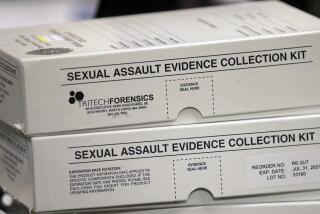U.S. Sets Up Physicians Data Bank : Repository to Compile Disciplinary, Malpractice Records
WASHINGTON — Health and Human Services Secretary Otis R. Bowen on Friday announced the formation of the first central nationwide data bank to collect and disseminate disciplinary and malpractice information on physicians and dentists.
“No longer will adverse information be . . . unavailable to hospitals and others who need to know a health professional’s record,” Bowen said at a press conference. “And, therefore, no longer will incompetent health professionals be enabled to move from hospital to hospital, or from state to state while withholding adverse information on their professional competence.”
Set to Begin in Summer
The repository, which was authorized by legislation passed by Congress in 1986, is scheduled to begin during the summer of 1989. It will gather all information regarding final action on malpractice suits against any licensed health care provider, including out-of-court settlements; licensure disciplinary actions taken by state medical and dental boards, and professional review actions taken by such facilities as hospitals or health maintenance organizations that have a peer review mechanism and any adverse actions taken by professional societies against members as a result of a formal peer review procedure.
Although some states, including California, have publicized the names of health care professionals who have been disciplined, this data bank represents the first time that such information will be centrally available on a nationwide basis.
Once it is operational, all U.S. hospitals will be required to consult the data bank when a physician or dentist seeks to join the staff or receive clinical privileges. Further, they also will be required to consult it every two years concerning those physicians or dentists already on their staffs or with clinical privileges. There will be civil penalties for those who fail to comply, Bowen said.
Licensing Key Issue
The repository also will be accessible to such health care organizations as group medical and dental practices, when a physician or dentist applies for an appointment or privileges, as well as to state licensing boards, so that “the licensing board will have an opportunity to license or not license,” Bowen said.
Also, an attorney for a plaintiff in a malpractice action may consult the data bank under certain conditions, and physicians and dentists themselves will be permitted to review the data bank regarding their own records and may request corrections or a review of the information, Bowen said.
However, the average American consumer will not be permitted to use it. “The main reason is the necessity for confidentiality,” said Bowen, emphasizing that the settlement or loss of a malpractice suit “is no sign that malpractice has actually occurred.”
He said he expects hospitals and other facilities to seek additional information regarding suits described in the data bank and that he hopes they would not “unfairly judge” physicians based on the data.
The American public, Bowen said, has “other ways” in which to make a choice regarding physicians, such as “asking neighbors or friends” or consulting the local medical society. “Those means are very adequate,” he said.
But Dr. Sidney Wolfe, director of the Public Citizen Health Research Group, said the American public is entitled to such information. “We believe that any kind of legitimate, finalized information should be made known,” he said. “(Consumers) should be able to get the name of any doctor in the country who has ever been disciplined.”
Other reaction was positive.
“We will finally have a national system to keep track of the disciplinary records of licensed health care professionals,” said Rep. Ron Wyden (D-Ore.), a sponsor of the legislation. “In the past, incompetents have been able to slip through the cracks and inflict poor medical care on the American consumer.”
Rep. Tom Tauke (R-Iowa), another sponsor of the bill, agreed. “We are taking a major step forward in protecting and strengthening the quality of health care in our nation,” he said.
The American Medical Assn. originally opposed the data bank for reasons of “confidentiality and paper work,” according to a former AMA official. However, Bowen said, the organization “has been cooperative and supportive.” AMA officials could not be reached for comment.
Bowen said that the new data bank does not “represent a new layer of federal regulation of the health care system,” but instead is “a mechanism whereby the professions can more easily and effectively carry out their own quality assurance functions.” Further, he said, “if we can eliminate incompetent physicians,” it may be “one way of helping to keep medical malpractice insurance rates down.”
More to Read
Sign up for Essential California
The most important California stories and recommendations in your inbox every morning.
You may occasionally receive promotional content from the Los Angeles Times.









